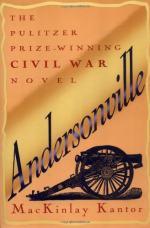Sickness
and sorrow, pain and death
Are
felt and feared no more.
Our “preparations,” for leaving were few and simple. When the morning came, and shortly after the order to move, Andrews and I picked our well-worn blanket, our tattered overcoat, our rude chessmen, and no less rude board, our little black can, and the spoon made of hoop-iron, and bade farewell to the hole-in-the-ground that had been our home for nearly seven long months.
My feet were still in miserable condition from the lacerations received in the attempt to escape, but I took one of our tent poles as a staff and hobbled away. We re-passed the gates which we had entered on that February night, ages since, it seemed, and crawled slowly over to the depot.
I had come to regard the Rebels around us as such measureless liars that my first impulse was to believe the reverse of anything they said to us; and even now, while I hoped for the best, my old habit of mind was so strongly upon me that I had some doubts of our going to be exchanged, simply because it was a Rebel who had said so. But in the crowd of Rebels who stood close to the road upon which we were walking was a young Second Lieutenant, who said to a Colonel as I passed:
“Weil, those fellows can sing ‘Homeward Bound,’ can’t they?”
This set my last misgiving at rest. Now I was certain that we were going to be exchanged, and my spirits soared to the skies.
Entering the cars we thumped and pounded toilsomely along, after the manner of Southern railroads, at the rate of six or eight miles an hour. Savannah was two hundred and forty miles away, and to our impatient minds it seemed as if we would never get there. The route lay the whole distance through the cheerless pine barrens which cover the greater part of Georgia. The only considerable town on the way was Macon, which had then a population of five thousand or thereabouts. For scores of miles there would not be a sign of a human habitation, and in the one hundred and eighty miles between Macon and Savannah there were only three insignificant villages. There was a station every ten miles, at which the only building was an open shed, to shelter from sun and rain a casual passenger, or a bit of goods.
The occasional specimens of the poor white “cracker” population that we saw, seemed indigenous products of the starved soil. They suited their poverty-stricken surroundings as well as the gnarled and scrubby vegetation suited the sterile sand. Thin-chested, round-shouldered, scraggy-bearded, dull-eyed and open-mouthed, they all looked alike—all looked as ignorant, as stupid, and as lazy as they were poor and weak. They were “low-downers” in every respect, and made our rough and simple. minded East Tennesseans look like models of elegant and cultured gentlemen in contrast.
We looked on the poverty-stricken land with good-natured contempt, for we thought we were leaving it forever, and would soon be in one which, compared to it, was as the fatness at Egypt to the leanness of the desert of Sinai.




